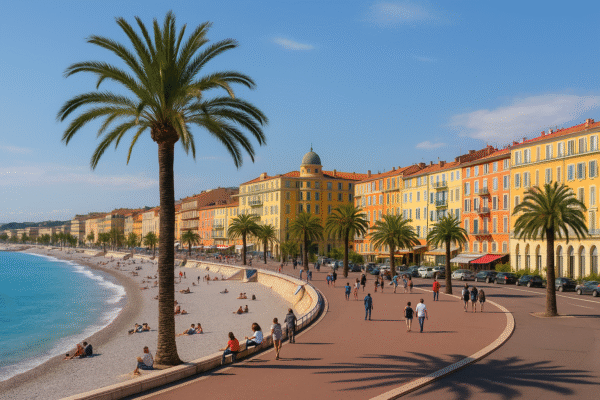Once considered merely a transit stop en route to Monaco or Saint-Tropez, Nice, France is quickly reclaiming its place as a must-visit destination along the French Riviera. With its elegant fusion of old-world charm and modern sophistication, the city is becoming a beacon for travelers seeking authentic experiences beyond the touristy polish of its glitzier neighbors.
Strategically located along the sun-drenched Mediterranean coast, Nice has always offered postcard-perfect views and a mild climate. But today’s Nice is far more than just a beautiful backdrop—it is a city reborn, vibrant with gourmet innovation, design-forward hotels, and cultural experiences that embrace both tradition and reinvention.
The Renaissance of a Riviera Classic
Founded as early as 350 B.C., Nice has long welcomed European aristocrats and artists drawn by its golden light and seafront splendor. In recent years, the city has evolved, embracing a more refined energy that’s catching the attention of discerning global travelers.
Wandering through Vieux Nice (Old Town), visitors discover a rejuvenated heart where artisan boutiques, vegetarian bistros, and concept gelato parlors sit comfortably alongside 17th-century architecture. Trendy newcomers like Lavomatique, a creative vegetarian restaurant, and Frisson, which combines ice cream artistry with contemporary fashion, highlight the city’s blend of modern creativity with Mediterranean roots.
Hôtel du Couvent: Historic Tranquility Meets Contemporary Style
Perhaps the most telling symbol of Nice’s upscale revival is the much-lauded Hôtel du Couvent, a former Franciscan convent turned luxury sanctuary on Castle Hill (Colline du Château). Spearheaded by entrepreneur Valéry Grégo, this 88-room hotel is the epitome of understated elegance—balancing monastic heritage with modern-day refinement.
Guests are welcomed with freshly baked madeleines and guided through lush tiered gardens that house a bakery, library, and even a working apothecary. Rooms are minimalist yet warm, adorned in calming taupe tones and curated vintage décor. The experience is less about ostentation and more about curated serenity—ideal for travelers craving an immersive connection with place and history.
A Culinary Scene Steeped in Innovation and Locality
Nice’s culinary awakening is another magnet for modern visitors. While the Niçoise salad remains a staple, a wave of inventive chefs and passionate locals are pushing the boundaries of Mediterranean cuisine.
At Maison Joia, diners are treated to elevated dishes that combine Corsican cheeses, Portuguese pastries, and Provençal herbs, all sourced from regional producers. The restaurant represents the broader culinary movement in Nice—honoring heritage while innovating with flair.
Small venues like Fanfan & Loulou, a pandemic-era wine bar, demonstrate the city’s growing affinity for natural wines and community-centered spaces. Its owners, Fanny Vedreine and Louis Girodet, focus on offering a welcoming atmosphere where travelers and locals bond over bold reds and crisp whites from nearby vineyards.
Even bakeries are in on the action. Marinette, a standout boulangerie, has locals lining up daily for its famed cinnamon rolls and buttery viennoiseries. These humble pleasures capture the essence of Nice’s revitalization: traditional, delicious, and unpretentious.
More Than Just a Pretty Promenade
While the Promenade des Anglais remains a must-see stretch of seaside splendor, Nice is equally appealing for its cultural offerings and community-driven atmosphere. From the Cours Saleya flower and produce market to performances at the Théâtre National de Nice, the city encourages exploration far beyond the usual beach day itinerary.
Museums like the Musée Matisse and Musée Marc Chagall underscore the city’s artistic pedigree, while neighborhood cafés invite lingering conversation and people-watching over a glass of rosé. Best of all, Nice has maintained a down-to-earth quality even as it modernizes. Unlike some Riviera destinations that feel over-commercialized, Nice retains a strong local identity.
This authenticity is echoed in the city’s hospitality scene, where most boutique hotels and eateries are independently owned and operated by Niçois entrepreneurs. Their deep roots and passion for preserving the city’s unique rhythm are evident in every curated wine list and bespoke hotel suite.
A Destination on Its Own Terms
In many ways, Nice is the Riviera’s quiet rebel—refusing to be overshadowed by the flash of Cannes or the luxury yachts of Monaco. It doesn’t need to compete. Instead, Nice draws strength from its own identity: laid-back yet elegant, artistic yet approachable.
The city’s deliberate evolution has made it more than a stopover—it’s a standalone destination for culture lovers, culinary enthusiasts, and sunseekers alike. With easy international access via Nice Côte d’Azur Airport and growing recognition from global travel authorities like Atout France and UNESCO (the Promenade des Anglais is part of a World Heritage-listed cityscape), Nice is well positioned for a tourism renaissance.
Whether you’re strolling under citrus trees in a hidden courtyard, sampling natural wine in a tucked-away bar, or watching the sun dip below the Mediterranean from your hotel balcony, Nice invites you to slow down and experience the Riviera’s true soul.
Plan Your Visit:
- How to Get There: Fly into Nice Côte d’Azur Airport (NCE), just 7 km from the city center. Direct trains connect Nice to Monaco, Cannes, and Marseille.
- Best Time to Visit: Late spring (May–June) or early autumn (September–October) for fewer crowds and perfect beach weather.
- Tourism Info: Visit the official website of the Nice Tourism Office for updated event calendars, hotel bookings, and city passes.
For more travel news like this, keep reading Global Travel Wire
















